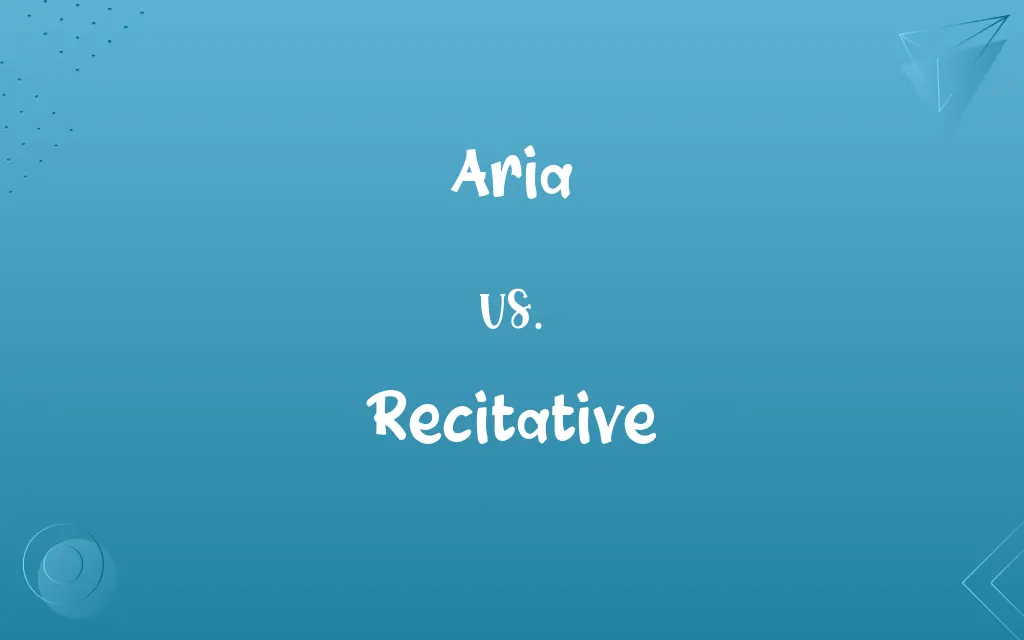Aria vs. Recitative: Know the Difference

By Shumaila Saeed || Updated on December 25, 2023
An aria is a melodic, expressive solo piece in operas, while a recitative is more speech-like, used for dialogue or narrative progression.

Key Differences
An aria is characterized by its melodic richness and emotional expression, often a highlight in operas. A recitative, conversely, adopts a speech-like, declamatory style, closely following the rhythms of spoken language.
Shumaila Saeed
Nov 30, 2023
Arias serve as the centerpiece for a character's emotional expression, showcasing vocal virtuosity. Recitatives drive the plot forward, providing context, dialogue, or narrative in a more direct manner.
Shumaila Saeed
Nov 30, 2023
An aria is typically accompanied by a full orchestra, emphasizing its musical importance. A recitative often has minimal accompaniment, like a harpsichord or a piano, focusing on the text's clarity.
Shumaila Saeed
Nov 30, 2023
Arias are known for their poetic, elaborate lyrics, reflecting deep emotions or thoughts. Recitatives, however, tend to have simpler, more conversational lyrics, mirroring natural speech patterns.
Shumaila Saeed
Nov 30, 2023
Arias are often the most memorable parts of an opera, celebrated for their emotional depth and technical challenge. Recitatives, while less showy, are crucial for their role in storytelling and transitioning between scenes or arias.
Shumaila Saeed
Nov 30, 2023
ADVERTISEMENT
Comparison Chart
Role in Opera
Emotional expression and vocal showcase
Narrative progression and dialogue
Shumaila Saeed
Nov 30, 2023
Performance
Celebrated for technical skill and emotion
Crucial for storytelling and transitions
Shumaila Saeed
Nov 30, 2023
ADVERTISEMENT
Aria and Recitative Definitions
Aria
An aria is a solo vocal piece with instrumental accompaniment in an opera.
The soprano's aria was the highlight of the opera.
Shumaila Saeed
Nov 24, 2023
Recitative
A recitative is a musical declamation with minimal accompaniment.
The soprano performed the recitative with expressive clarity.
Shumaila Saeed
Nov 24, 2023
Aria
Aria refers to a melodic and expressive song in classical music.
The tenor's aria expressed deep emotion.
Shumaila Saeed
Nov 24, 2023
Recitative
Recitative denotes a narrative song, resembling speech more than melody.
His recitative bridged the scenes seamlessly.
Shumaila Saeed
Nov 24, 2023
Aria
An aria is a standalone piece showcasing a singer's vocal abilities.
Her aria captivated the audience with its complexity.
Shumaila Saeed
Nov 24, 2023
ADVERTISEMENT
Recitative
A recitative is a style of vocal music that imitates speech and advances the plot in opera.
The recitative set the scene for the next act.
Shumaila Saeed
Nov 24, 2023
Aria
An aria is an operatic solo that highlights emotional expression.
The dramatic aria conveyed the character's despair.
Shumaila Saeed
Nov 24, 2023
Recitative
Of, relating to, or having the character of a recital or recitation.
Shumaila Saeed
Oct 19, 2023
Aria
Aria denotes a lyrical piece in operas, distinct for its musicality.
The baritone's aria was a masterful display of vocal prowess.
Shumaila Saeed
Nov 24, 2023
Recitative
A style used in operas, oratorios, and cantatas in which the text is declaimed in the rhythm of natural speech with slight melodic variation and little orchestral accompaniment.
Shumaila Saeed
Oct 19, 2023
Recitative
A passage rendered in this style. In both senses also called recitativo.
Shumaila Saeed
Oct 19, 2023
Recitative
(music) dialogue, in an opera etc, that, rather than being sung as an aria, is reproduced with the rhythms of normal speech, often with simple musical accompaniment or harpsichord continuo, serving to expound the plot.
In Gilbert and Sullivan's Patience, Bunthorne performs the recitative "Am I Alone and Unobserved?" before going on to his solo aria "If You're Anxious For To Shine".
Shumaila Saeed
Oct 19, 2023
Aria
(music) A musical piece written typically for a solo voice with orchestral accompaniment in an opera or cantata.
Shumaila Saeed
Oct 19, 2023
Recitative
A species of musical recitation in which the words are delivered in a manner resembling that of ordinary declamation; also, a piece of music intended for such recitation; - opposed to melisma.
Shumaila Saeed
Oct 19, 2023
Recitative
Of or pertaining to recitation; intended for musical recitation or declamation; in the style or manner of recitative.
Shumaila Saeed
Oct 19, 2023
Recitative
A vocal passage of narrative text that a singer delivers with natural rhythms of speech
Shumaila Saeed
Oct 19, 2023
Recitative
Recitative refers to the sung dialogue in operas and oratorios.
The recitative provided important narrative details.
Shumaila Saeed
Nov 24, 2023
Recitative
A recitative is an operatic piece used for storytelling or dialogue.
The recitative conveyed the character's thoughts effectively.
Shumaila Saeed
Nov 24, 2023
Repeatedly Asked Queries
What is an aria in opera?
An aria is a solo vocal piece, often emotionally expressive, in operas.
Shumaila Saeed
Nov 30, 2023
Can an aria be part of a symphony?
While uncommon, an aria can be included in a symphony as a vocal solo.
Shumaila Saeed
Nov 30, 2023
What is the purpose of a recitative?
The purpose of a recitative is to advance the opera's plot and present dialogue.
Shumaila Saeed
Nov 30, 2023
How does an aria differ from a song?
An aria is more elaborate and expressive, typically part of an opera, unlike a regular song.
Shumaila Saeed
Nov 30, 2023
How does an aria express emotion?
An aria expresses emotion through its melodic complexity and the performer's vocal expression.
Shumaila Saeed
Nov 30, 2023
What distinguishes a recitative from spoken dialogue?
Unlike spoken dialogue, a recitative is sung and follows musical rhythms.
Shumaila Saeed
Nov 30, 2023
Is recitative accompanied by orchestra?
Recitative is usually accompanied minimally, often just by a harpsichord or piano.
Shumaila Saeed
Nov 30, 2023
Can arias have multiple parts?
Yes, some arias may have multiple sections or parts, each with different themes.
Shumaila Saeed
Nov 30, 2023
Do recitatives contain rhymes?
Recitatives don't typically focus on rhymes; they prioritize clear storytelling.
Shumaila Saeed
Nov 30, 2023
How long is a typical recitative?
Recitative lengths vary, usually depending on the narrative content they convey.
Shumaila Saeed
Nov 30, 2023
Can arias be instrumental?
Arias are primarily vocal, though instrumental versions can exist as adaptations.
Shumaila Saeed
Nov 30, 2023
Is recitative improvised?
Recitative is usually composed, not improvised, but allows for expressive freedom.
Shumaila Saeed
Nov 30, 2023
Do all operas have arias and recitatives?
Most traditional operas feature both arias and recitatives, but their use varies.
Shumaila Saeed
Nov 30, 2023
Are recitatives easy to sing?
Singing recitative requires skill in rhythm and diction, even though it's less melodic.
Shumaila Saeed
Nov 30, 2023
Can arias be part of concerts?
Yes, arias are often performed in concerts as standalone pieces.
Shumaila Saeed
Nov 30, 2023
What makes an aria memorable?
An aria's memorability often lies in its melody, emotion, and vocal challenge.
Shumaila Saeed
Nov 30, 2023
What skills are needed to perform recitative?
Performing recitative requires good vocal control, clear diction, and expressive delivery.
Shumaila Saeed
Nov 30, 2023
Are arias always in a foreign language?
Arias are frequently in Italian, German, or French, but can be in any language, including English.
Shumaila Saeed
Nov 30, 2023
Do contemporary operas use arias and recitatives?
Contemporary operas may use arias and recitatives, often with modern interpretations.
Shumaila Saeed
Nov 30, 2023
What emotions can an aria convey?
Arias can convey a wide range of emotions, from joy and love to despair and anger.
Shumaila Saeed
Nov 30, 2023
Share this page
Link for your blog / website
HTML
Link to share via messenger
About Author
Written by
Shumaila SaeedShumaila Saeed, an expert content creator with 6 years of experience, specializes in distilling complex topics into easily digestible comparisons, shining a light on the nuances that both inform and educate readers with clarity and accuracy.






































































